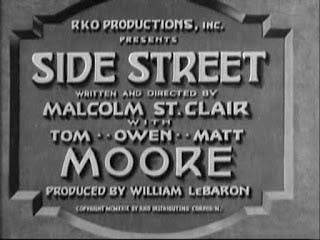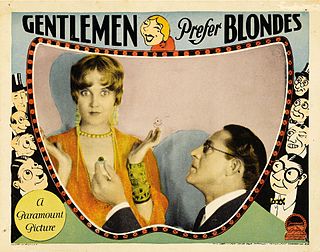
The Goat is a 1921 American two-reel silent comedy film written, and co-directed by Malcolm St. Clair and Buster Keaton and starring Keaton.

Side Street is a 1929 American Pre-Code film featuring the only screen teaming of all three Moore Brothers, each of them major silent film stars. George Raft also makes an uncredited appearance as a professional dancer — which Raft was at the time — dancing to the song "Take a Look at Her Now", sung by June Clyde. Side Street was directed by Malcolm St. Clair with a screenplay by George O'Hara and Jane Murfin, based on a story by St. Clair, which was adapted by John Russell.

Montana Moon is a 1930 pre-Code Western musical film which introduced the concept of the singing cowboy to the screen. Starring Joan Crawford, Johnny Mack Brown, Dorothy Sebastian, and Ricardo Cortez, the film focuses on the budding relationship between a city girl and a rural cowboy.

Gentlemen Prefer Blondes is a 1928 American silent comedy film directed by Mal St. Clair, co-written by Anita Loos based on her 1925 novel, and released by Paramount Pictures. No copies are known to exist, and it is now considered to be a lost film. The Broadway version Gentlemen Prefer Blondes starring Carol Channing as Lorelei Lee was mounted in 1949. It was remade into the film Gentlemen Prefer Blondes with Jane Russell as Dorothy Shaw and Marilyn Monroe as Lorelei Lee in 1953, directed by Howard Hawks.

The Blacksmith is a 1922 American short comedy film co-written, co-directed by Malcolm St. Clair and Buster Keaton and starring Keaton.

Goldie Gets Along is a 1933 American pre-Code comedy film directed by Malcolm St. Clair and starring Lili Damita, Charles Morton and Sam Hardy. The screenplay was written by William A. Drake, based on the 1931 novel of the same title by Hawthorne Hurst.

Good and Naughty is a 1926 American silent romantic comedy film directed by Malcolm St. Clair and starring Pola Negri and Tom Moore. It was based on the play Naughty Cinderella by Henri Falk and René Peter. Released in 1926, it is a romantic comedy of mistaken identity about an attractive interior decorator (Negri) who is forced to make herself unattractive so she can be hired by a firm that has a policy against hiring attractive women.

The Grand Duchess and the Waiter is a 1926 American silent romantic comedy film directed by Mal St. Clair and starring Florence Vidor and Adolphe Menjou. A “sophisticated comedy,” this Paramount production is based on a stage play by Alfred Savoir entitled La Grande-duchesse et le garcon d'etage (1924).

Dangerous Nan McGrew is a 1930 Pre-Code American musical comedy film starring Helen Kane, Victor Moore and James Hall and directed by Malcolm St. Clair.

Yankee Doodle in Berlin is a 1919 American silent comedy and World War I film from producer Mack Sennett. A five-reel feature, it was Sennett's most expensive production up to that time. Hiram Abrams was the original State's Rights marketer before the film's release, but producer Sol Lesser bought the rights in March 1919.

The Show-Off is a 1926 American silent film comedy produced by Famous Players–Lasky and distributed by Paramount Pictures, based on the play of the same name by George Kelly. Directed by Mal St. Clair, the film stars Ford Sterling, Lois Wilson and Louise Brooks.

Hollywood Cavalcade is a 1939 American film featuring Alice Faye as a young performer making her way in the early days of Hollywood, from slapstick silent pictures through the transition from silent to sound.

The Lighthouse by the Sea is a 1924 American silent adventure film produced by and distributed by Warner Bros. The film's star is canine sensation Rin Tin Tin, the most famous animal actor of the 1920s. The film was directed by Malcolm St. Clair.

Breakfast at Sunrise is a 1927 silent film comedy directed by Malcolm St. Clair and produced by and starring Constance Talmadge. It was distributed by First National Pictures.

Find Your Man is a 1924 American silent action/ melodrama film starring Rin Tin Tin and June Marlowe. It was directed by Mal St. Clair who persuaded Warner Bros. to hire his friend, Darryl F. Zanuck, to write the screenplay; this began a long association between Zanuck and Rin Tin Tin. Filming took place in Klamath Falls, Oregon. This film survives. It was transferred onto 16mm film by Associated Artists Productions in the 1950s and shown on television.

The Trouble with Wives is a 1925 American silent comedy film directed by Malcolm St. Clair, written by Sada Cowan and Howard Higgin, and starring Florence Vidor, Tom Moore, Esther Ralston, Ford Sterling, Lucy Beaumont, and Edgar Kennedy. It was released on September 28, 1925, by Paramount Pictures.

Knockout Reilly is a lost 1927 American silent drama film directed by Malcolm St. Clair and written by Pierre Collings, John W. Conway, and Kenneth Raisbeck based upon a story by Albert Payson Terhune. The film stars Richard Dix, Mary Brian, Jack Renault, Harry Gribbon, Osgood Perkins, and Lucia Backus Seger. The film was released on April 16, 1927, by Paramount Pictures.

On Thin Ice is a 1925 American silent crime drama film directed by Mal St. Clair and starring Tom Moore, Edith Roberts, and William Russell. It was produced and distributed by the Warner Bros. and based upon a 1924 novel by Alice Ross Colver.
George Washington Jr. is a lost 1924 American silent comedy film directed by Malcolm St. Clair and written by Rex Taylor. It is based on the 1906 play George Washington Jr. by George M. Cohan. The film stars Wesley Barry, Gertrude Olmstead, Léon Bary, Heinie Conklin, Otis Harlan, and William Courtright. The film was released by Warner Bros. on February 2, 1924.

After Business Hours is a 1925 American silent drama film directed by Malcolm St. Clair and starring Elaine Hammerstein, Lou Tellegen, and Phyllis Haver.



















